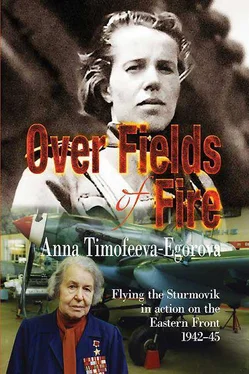We were in retreat with our troops. Falling back to the Don we kept changing airfields one after another. Everyone was getting extremely tired, literally dead on his feet: we were getting a lot of missions. There was no time for rest, no place to eat — and sometimes even nothing to eat. Lunch cooked at an old aerodrome would arrive at a new one, and sometimes would not find its way to us at all. We slept anywhere, in cockpits and on plane covers under the wings. The moment you dozed off they would yell: “Board your planes!”
One of those days Potanin — a pilot from our squadron — was ordered to fly reconnaissance: to determine where the enemy’s mechanised columns had advanced to and what their strength was; to find out where the troop and materiel trains were and in which direction they were moving; to locate concentrations of Hitlerite troops and estimate their numbers. With Potanin went Belov as a navigator, a man straight out of architectural institute. Soon the pilot and the navigator noticed the Hitlerite tank and motorised columns moving south-east to the Don, towards its great bend. Our troops were in retreat and the German air force was on the rampage — bombing the roads crammed with refugees.
Having completed the reconnaissance Potanin and Belov turned back. They flew camouflaging themselves far away from roads and settlements. But the Fascists too were advancing sideways, in large and quite small detachments and groups. One such detachment attracted the attention of the crew by its strangeness — about 40-50 men in camouflage cloaks. Potanin thought they were our troops not knowing in which direction to move, and decided to show them the way. He made a steep turn above them, exiting it to the south-east, then another one — and suddenly the whole group shouldered their submachine-guns and opened fire at the plane with tracer bullets. “Anything can happen on the front”, Potanin decided. “Our troops might have strafed us by mistake”. But it turned out that it was German paratroopers who had fired at the U-2… The navigator fell silent and when Potanin glanced back Belov was pale and sitting with his head dropped lifelessly against the side of the cockpit. Anxiety for the life of his comrade prompted Potanin to land as soon as possible and give him first aid. He landed his plane right there in a field but by then no assistance was needed. Belov was dead…
During those hard days of our retreat, not far from Novocherkassk, we picked up a little kid of about three years of age. In nothing but a shirt, dirty, hungry, all covered with grazes, he couldn’t say anything but the word “mum”, whom he was calling incessantly, and his own name, Ilyusha 90 90 Editor’s note — a diminutive form of Ilya.
. Ilyusha was by now unable to cry and just sobbed. Approaching soldiers told us that recently a string of carts had been smashed by German aircraft and that they had seen this boy by his dead mother. And then when the Fascist vultures swooped again everyone had scattered in all directions. The boy had apparently run away too and so he had survived.
We didn’t know what to do with him or whom to leave him with. We had to fly on but Ilyusha grabbed me by the neck and it seemed no force could tear him away from me. And then I decided to take the child with me. “Have you lost your mind? The kid needs care. What can you give him? Do you know where we’re going to stop next?” the pilots shouted at me. But I clasped Ilyusha to myself even harder and ran to the village. Coming towards me I found an old woman with a walking stick. Shielding her eyes with her hand she looked long and closely at the child and then began crying and wailing, “Ilyushen’ka, my grandchild!” I handed the kid over to the old woman and rushed towards my plane in tears. And then suddenly everything became so unbearably painful and distressing! And for this orphaned Ilyushka too (how many of them were there on the wartime roads!), and for the misspent years, and for myself… I loved kids so much, I wanted so much to have my own big family — many naughty little boys, mop-headed girls! The war had crossed out and ruined all such dreams… I remembered Victor Kroutov often. I hadn’t heard anything from him for five months already. He was fighting somewhere on the North-Western Front. During those minutes when I was alone with my reflections the thought “is he still alive?..” would weigh heavily on my soul. I kept trying to convince myself that letters not arriving were the fault of the field mail. But I’ll be patient, I’ll wait until they come… At those moments I cursed myself amidst tears for being such a fool before the war: I had loved him to distraction for a long time, since the Metrostroy times and had never told him about it. Why?… “Do you love me?” he kept asking me during our dates and I would only laugh, and reply “What are you talking about? Of course not!” — “Kiss me goodbye!” — “Give me a break! Kiss me yourself if you want…” — “She loves me! She loves me!” Victor would shout loudly and whirl me round and round holding me tightly by the hands…
Everyone in the squadron — both pilots and mechanics — treated me well. Some ‘suitors’ appeared as well but I managed somehow to talk to them not tête-à-tête but in front of others — that way it was easier to fend off an ‘attack’ and let it be known that nothing was going to come of it. It wasn’t easy, of course, to be a single woman in a group of men. Sometimes I wanted so much just to talk to someone heart to heart. But one stern word — War — held me back and cowed me…
We flew over to an airfield previously prepared near Cherkassk but there was no headquarters, no canteen nor any fuel. Our land transport was a roundabout route via Maikop, Tuapse, Tbilisi and Ordzhonikidze because the straight road to Grozny had been cut by the enemy. Senior Lieutenant Listarevich had been appointed Land Transport Commander and Lieutenant Irkoutskiy Commissar. They left on 18 August 1942 — on Air Force Day itself — but we didn’t feel like celebrating at this hard time of retreat. And our ‘base’ caught up with the squadron only on 30 October when the Front headquarters was already in Grozny. Thus when we had landed and turned off the engines, we gathered by the Deputy Squadron Commander Pen’kov’s plane and began to think what to do next. We saw an ageing woman coming from the settlement we had landed near. She greeted us, looked us over and said “Do you have anything to eat, maybe you’re hungry?” And without hearing an answer she suggested straightaway “I’ve cooked a bucket-size pot of borsch . As if I knew you would come around. My son is a pilot, after all, but I haven’t heard from him for a long time…” and she began to sniffle, wiping her eyes with the lap of her broad blouse.
After a tasty lunch we decided to pour the left-over petrol into the tanks of one plane and fly to look for the rear services of our squadron. I happened to fly with Cherkasov. Again under our wings there was land enveloped by smoke, burning houses, burning unharvested wheat, corn, sunflowers. People were moving in carts and on foot, with parcels, with cows on leashes. It was painful to watch and even more painful to know that you couldn’t help them.
Only five days later, somewhere near Pyatigorsk, at last we found our headquarters. Here they read out ‘Order 227’, a stern order whose meaning boiled down to: “Not a step back!” As a rule the order numbers were remembered only by staff officers. But even now this one, Order number 227, will be recalled by any war veteran if asked about it. It was said in this order that we had to defend every position, every single metre of our soil to the last drop of blood. Those who reckoned that the territory of the Soviet Union was big enough and we could retreat even deeper into it, to lines more suitable for defence, were condemned. The order obliged us to declare a resolute war on cowards, panic-mongers, infringers of discipline. To comply with this demand meant to save the motherland, to defeat the enemy.
Читать дальше












